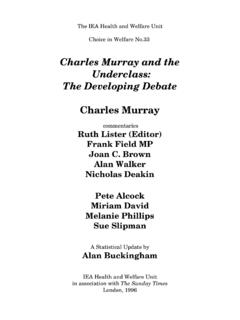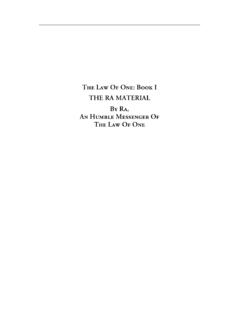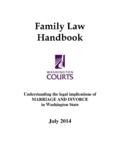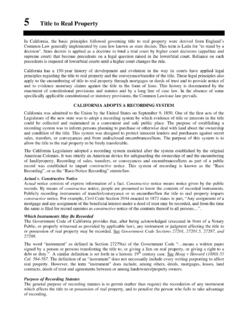Transcription of Sharia Law or ‘One Law For All’? - Civitas
1 Sharia Law or one law For All ? Sharia Law or one law For All? Denis MacEoin David G. Green (Editor) Foreword by Neil Addison Civitas : Institute for the Study of Civil Society London First Published June 2009 Neil Addison: Sharia Tribunals in Britain Mediators or Arbitrators? All other material Civitas 2009 77 Great Peter Street London SW1P 2EZ Civitas is a registered charity (no. 1085494) and a company limited by guarantee, registered in England and Wales (no. 04023541) email: All rights reserved ISBN 978 1 906837 08 2 Independence: Civitas : Institute for the Study of Civil Society is a registered educational charity (No. 1085494) and a company limited by guarantee (No.)
2 04023541). Civitas is financed from a variety of private sources to avoid over reliance on any single or small group of donors. All publications are independently refereed. All the Institute s publications seek to further its objective of promoting the advancement of learning. The views expressed are those of the authors, not of the Institute. Typeset by Civitas Printed in Great Britain by The Cromwell Press Group Trowbridge, Wiltshire v Contents Page Authors vi Foreword: Sharia Tribunals in Britain Mediators or Arbitrators? A Reflection by Neil Addison viii Editor s Introduction 1 Sharia Law or one law For All ? 9 Appendix: Summary of Online Fatwas 74 vi Authors Neil Addison is a practising barrister and the author of Religious Discrimination and Hatred Law, Taylor Francis Publishers, 2006.
3 He runs the website , and the Blog David G. Green is the Director of Civitas . His books include The New Right: The Counter Revolution in Political, Economic and Social Thought, Wheatsheaf, 1987; Reinventing Civil Society, IEA, 1993; Community Without Politics: A Market Approach to Welfare Reform, IEA, 1996; We re (Nearly) All Victims Now, Civitas , 2006 and Individualists Who Co operate, Civitas , 2009. He writes occasionally for newspapers, including in recent years pieces in The Times, The Sunday Times, the Sunday Telegraph and the Daily Telegraph. Dr Denis MacEoin holds degrees from Trinity College, Dublin, Edinburgh University and Cambridge (King s College). From 1979 80, he taught at Mohammed V University in Fez, Morocco, before taking up a post as lecturer in Arabic and Islamic Studies at Newcastle.
4 In 1986, he was made Honorary Fellow in the Centre for Islamic and Middle East Studies at Durham University. He has published extensively on Islamic topics, contributing to the Encyclopaedia of Islam, the Oxford Encyclopaedia of Islam in the Modern World, the Encyclopaedia Iranica, the Penguin Handbook of Living Religions, journals, festschrifts and books, and has AUTHORS vii himself written a number of books including The Sources for Babi History and Doctrine, Rituals in Babism and Baha ism, and The Messiah of Shiraz: Studies in Early and Middle Babism; he has also edited Islam in the Modern World with Ahmad al Shahi. In 2007 he published The Hijacking of British Islam, a study of hate literature found in UK mosques, and his report Music, Chess and Other Sins was published online by Civitas in 2009.
5 In 1992 HarperCollins published a volume of his journalism under the title New Jerusalems: Islam, Religious Fundamentalism, and the Rushdie Affair. He has written 25 novels and is translated into some 15 languages. viii Foreword Sharia Tribunals in Britain Mediators or Arbitrators? Both the Archbishop of Canterbury and the Lord Chief Justice ran into controversy in 2008 by appearing to suggest that Sharia courts or tribunals should be given a role in the settlement of disputes. Part of the controversy, of course, arises from the fact that Sharia law in its fullness covers both criminal as well as civil law though, in fairness, both speakers were directing their remarks at the possible role of Sharia tribunals as a mechanism of Alternative Dispute Resolution (ADR), especially in the settlement of matrimonial and family disputes.
6 A similar suggestion was reportedly made, though to less publicity, by the former Chairman of the Bar Mr Stephen Hockman The Archbishop in his speech said: there are ways of looking at marital disputes, for example, which provide an alternative to the divorce courts as we understand them. In some cultural and religious settings they would seem more 1 See: lawshould be introduced into legal system says leading 2 NEIL ADDISON ix Whilst the LCJ said: There is no reason why principles of Sharia law, or any other religious code, should not be the basis for mediation or other forms of alternative dispute was then followed by press reports that Sharia courts were already operating in Britain, in particular in the form of the Muslim Arbitration Tribunal (MAT).
7 4 The revelation that these courts were having their arbitration decisions (fatwas5) enforced by the state courts, in accordance with the Arbitration Act 1996 has led to campaigns to ban all religious tribunals from operating under the Arbitration What I would suggest as also part of the reason for this public controversy is that both the Archbishop and the LCJ, together with the Muslim Arbitration Tribunal (MAT), have confused and merged together two separate and distinct ADR concepts, namely mediation and arbitration. 3 4 5 A Fatwa is the traditional title for a Sharia legal judgement or legal opinion. Sadly since the Ayatollah Khomeini issued his infamous Fatwa calling for the death of Salman Rushdie this respectable legal term has acquired an entirely negative connotation in the West and the mass media 6 , Sharia LAW OR one law FOR ALL ?
8 X Mediation is the classic ADR procedure and its purpose is to see if a legal dispute can be resolved by negotiation between the parties. The crucial point about mediation is that, even though most mediators are trained lawyers, mediation does not rely upon the application of legal rules or the determination of legal rights or wrongs it aims instead at finding common ground between parties and a solution they can both live with. (See for further analysis.) Arbitration by contrast is merely another form of trial before a judge who is not appointed by the state but is instead agreed to by the parties. Arbitration is especially used in business disputes usually in order to ensure that the judge has specialist knowledge of the area of business in question ( in building contracts for example there is invariably an arbitration clause providing for the appointment of an arbitrator who is either a qualified surveyor or architect), or arbitration is chosen in order to maintain business confidentiality since arbitration hearings are not open to the public.
9 It is important to note that mediation and arbi tration are not merely different in their philosophical basis but also different in their legal operation. Mediation may result in an agreement which can be subsequently presented to a court and registered as a legal decision but a mediator cannot impose a media tion decision and should not give directions or express opinions on legal issues or likelihoods of success. Mediation therefore leads to an agreement rather than a judgement and it is not, as such, regulated by statute. NEIL ADDISON xi More pertinently, a mediation agreement only has legal effect if it is ratified by a court which has to be satisfied that it is indeed an agreement between two parties who understand the legal consequences of what they have agreed to.
10 Arbitration, by contrast, is regulated by statute and involves the parties signing an arbitration agreement before the trial begins. The arbitrator can act in accordance with the rules of any legal system specified in the arbitration agreement including, of course, Sharia law and the ultimate judgement of the arbitrator can be registered with the civil courts and enforced in the same way as if it were a judgement of the ordinary civil courts. It is this aspect of civil courts enforcing arbitration judgements based on Sharia principles which has led to suggestions that Sharia law has been given official recognition. However it is important to understand that the Arbitration Act does not extend to all areas of law: it does not cover criminal disputes and it does not extend to divorce or childcare cases, which is where the problems arise with the views of the LCJ: there is no reason why principles of Sharia law, or any other religious code, should not be the basis for mediation.











